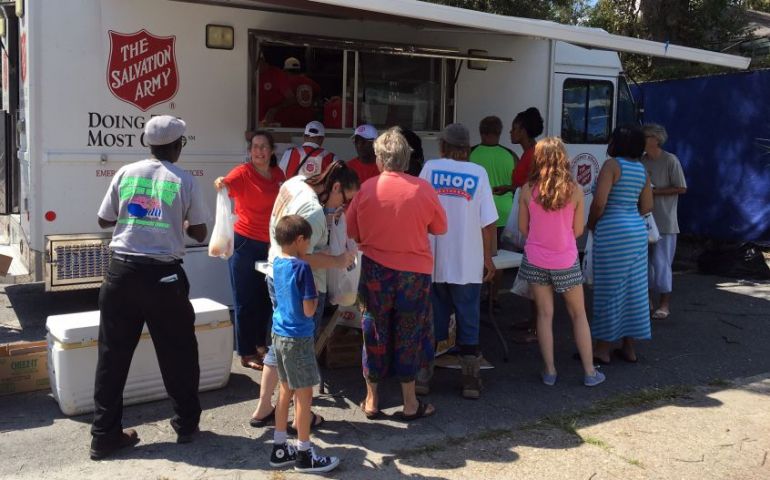As Waters Recede, Hope Remains
Lt. Jared Martin | jared.martin@uss.salvationarmy.org | (865) 255-2242

Brunswick, GA (September 15, 2017) – On Monday, a man, wife, and their four children watched from their front porch as the ocean swell rose up and flooded the wetland before them. They rushed out of their home, through the torrential rain as the water flooded their home, destroying their furniture and two cars, and shifting their historic home six feet off of the foundation. The family lost everything but their lives. This family sought and found help at The Salvation Army.
Another local survivor was already living on the edge of poverty. She stepped up to raise her four grandchildren and regularly worked with The Salvation Army to make sure those children woke up on Christmas to find presents under their tree. When the hurricane dropped a tree on her power line she lost power, and the ability to cook for her grandchildren.
She found a Salvation Army canteen serving hot meals on Norwich St. She said, “This hurricane can teach us to be grateful for what we have and to care about our neighbors. I think God is telling us to follow him and care for the people around us.”
Hurricane Irma has moved on, leaving millions of people across Florida, Georgia, and South Carolina without power. Survivors returning home may find little remaining, but they will find The Salvation Army providing more than 100,000 meals, clean water, and emotional care and support.
How to help those Harvey and Irma Hurt
A financial contribution is the best way to help. A cash donation allows charitable relief agencies to use monetary contributions to purchase exactly what disaster survivors need. Monetary contributions are also easy to get to the disaster area. Moving a container of donated goods can sometimes cost more than the value of the items. Getting a donated commodity into containers and onto a ship, or onto a truck, across the sea or across the country to the disaster site, through the port costs and the customs’ tariffs, quality checked, quantity checked and sorted, and organized into warehouses, incurs a cost at each step. Supplies can almost always be purchased locally at the disaster site and provide savings in multiple ways. Finally, money used to purchase needed items locally can support local and state economies, helping local businesses and workers, which have suffered losses in the wake of the disaster event.
Online: helpsalvationarmy.org
Donate by phone: 1-800-SAL-ARMY
Mail checks to: The Salvation Army P.O. BOX 1959 Atlanta, GA 30301
Please make checks payable to The Salvation Army and designate 'Hurricane 2017' on all checks.
To receive a donation link via text: Text STORM to 51555
About The Salvation ArmyThe Salvation Army annually helps more than 30 million Americans overcome poverty, addiction, and economic hardships through a range of social services. By providing food for the hungry, emergency relief for disaster survivors, rehabilitation for those suffering from drug and alcohol abuse, and clothing and shelter for people in need, The Salvation Army is doing the most good at 7,600 centers of operation around the country. In the first-ever listing of “America’s Favorite Charities” by The Chronicle of Philanthropy, The Salvation Army ranked as the country’s largest privately funded, direct-service nonprofit. For more information, visit www.SalvationArmyUSA.org. Follow us on Twitter @SalvationArmyUS and #DoingTheMostGood.